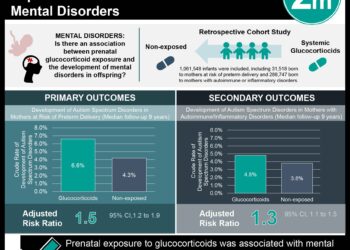Children who follow dietary, physical activity, sleep recommendations have fewer mental health visits
1. Children surveyed at age 10-11 who met more recommendations regarding diet, physical activity, sleep, and screen usage had fewer physician visits for mental illness in the following 4 years.
2. Of the 9 studied recommendations, 20% of surveyed children met 7 to 9 of them, while 10% met only 1 to 3.
Evidence Rating Level: 2 (Good)
Study Rundown: There is strong evidence linking lifestyle factors such as poor diet, sleep, and physical activity with chronic disease in children. Less is known about the relationship between lifestyle factors and mental illness in children, and current evidence is limited by small samples and self-reported measures of mental health. In this prospective cohort study, researchers linked health survey data with administrative health data to examine the association number of physician visits related to mental illness and adherence to dietary, physical activity, sleep, and screen usage recommendations. After adjusting for body weight and demographic factors, participants who met 7 to 9 recommendations had fewer than half the mental health visits that participants who met 1 to 3 recommendations had. Each additional recommendation met was associated with 15% fewer physician visits for mental illness.
These findings are limited by self-report of lifestyle behaviors and potential unmeasured confounders. Furthermore, researchers used physician visits for mental illness as a single outcome for mental health, without considering severity or specific diagnosis. Nonetheless, the study is strengthened by its large sample and use of an objective measure of mental illness. For physicians, these findings highlight the importance of lifestyle factors in childhood, notably physical activity, diet, sleep, and screen usage, in modulating risk for mental illness in later years.
Click to read the study, published today in Pediatrics
Relevant reading: Relationship Between Diet and Mental Health in Children and Adolescents: A Systematic Review
In-Depth [prospective cohort]: Researchers linked 2011 health survey data with 2011-2014 administrative health data to identify 3436 students age 10 to 11 years in Nova Scotia, Canada. All 5th grade students and their parents were invited to participate in the study; the Harvard Youth/Adolescent Food Frequency Questionnaire was administered to students by research assistants, and parents completed a survey on adolescents’ sleep habits, screen time usage, and demographic information. The study used negative binomial regression models to examine the associations between number of physician visits related to mental illness and adolescent adherence to 9 established lifestyle recommendations, which included: consumption of vegetables, fruit, grain products, milk, meat and alternatives, and sugar, as well as time spent on sleep, physical activity, and screen usage.
Of all adolescents in the study, 12% met 1 to 3 recommendations, 67% met 4 to 6 recommendations, and 21% met 7 to 9 recommendations. Meeting 7 to 9 recommendations was associated with 56% (95% confidence interval [CI]: 38%-69%) fewer mental health visits in the subsequent 4 years compared with meeting 1 to 3 recommendations, after adjusting for sex, body weight, parental education, household income, and region of residence. Each additional recommendation met was associated with 15% (95% CI: 9%-21%) fewer mental health visits in the subsequent 4 years.
Image: PD
©2019 2 Minute Medicine, Inc. All rights reserved. No works may be reproduced without expressed written consent from 2 Minute Medicine, Inc. Inquire about licensing here. No article should be construed as medical advice and is not intended as such by the authors or by 2 Minute Medicine, Inc.






